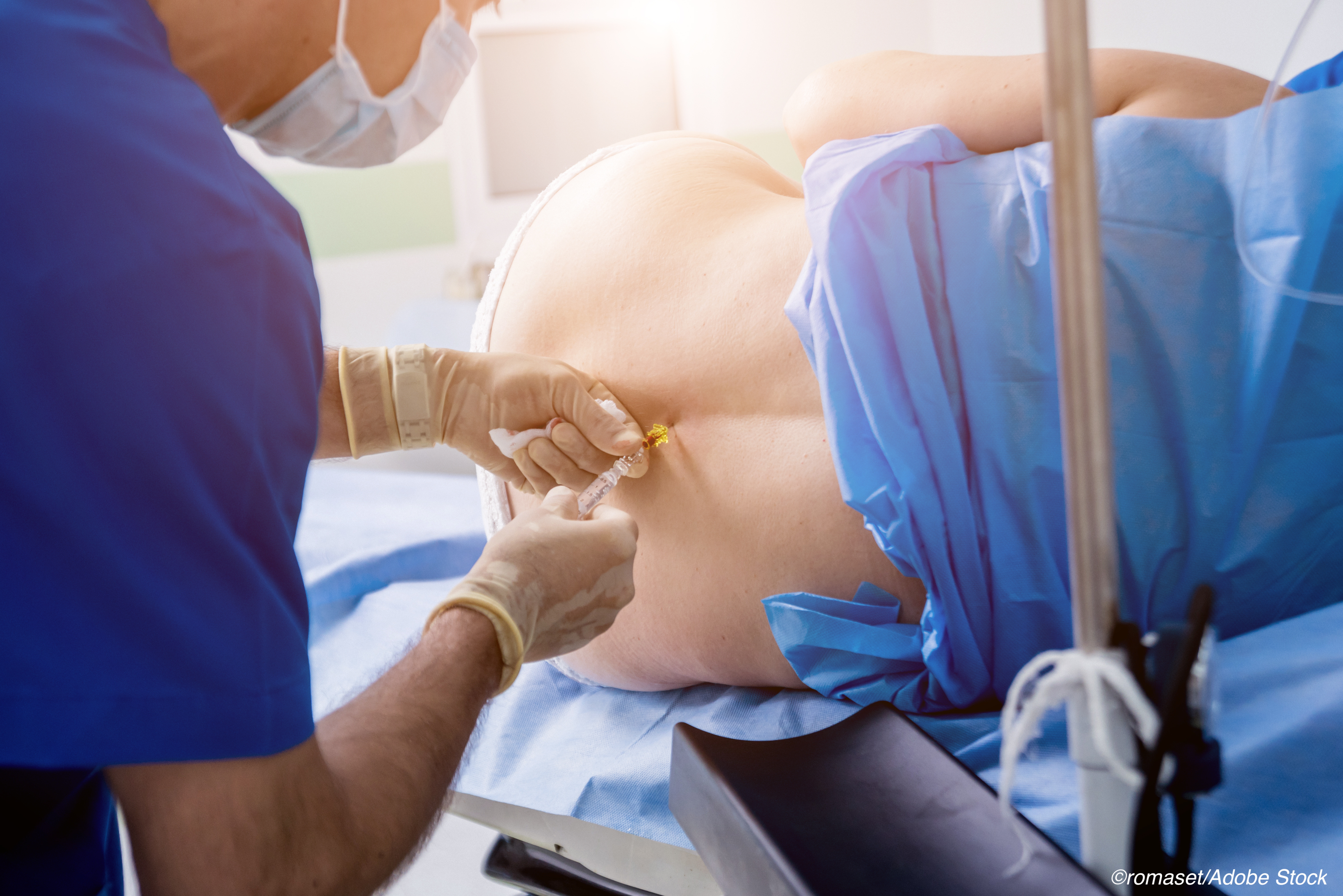In an analysis of live births registered with the Scottish National Health Service, epidural analgesia use was associated with an increased likelihood of surgical delivery and slight increases in neonatal resuscitation and need for NICU care. However, the study showed no association between epidural use and reduced newborn Apgar scores or adverse child development outcomes at age 2.
The findings, published in JAMA Network Open, did not support conclusions from several high profile studies linking epidural analgesic use during labor to poorer neonatal and early child development outcomes.
“In this population-based cohort study of 435,281 mother-offspring pairs, the use of epidural analgesia in labor was not associated with adverse neonatal outcomes after adjustment for confounders and mediation by mode of delivery,” wrote researcher Rachel Kearns, MD, of Glasgow Royal Infirmary, Scotland, and colleagues.
The researchers wrote that use of epidural pain relief during delivery is recommended by the World Health Organization and is used by nearly 3 out of 4 laboring women in the United States and a third of women in the United Kingdom.
They noted that the evidence linking epidural use during delivery to adverse neonatal or early childhood development outcomes remains inconclusive.
“Observational studies report mixed results, with some identifying an association between epidural analgesia and adverse neonatal outcomes and others not finding such a link,” they wrote. “Furthermore, studies of longer-term implications of epidural use in labor on childhood developmental outcomes are scarce and not representative of modern practice.”
A Cochrane review of 40 randomized controlled trials involving more than 11,000 laboring women showed no clear difference in neonatal outcomes between those who received epidural pain relief and those who did not, but the reviewers judged the overall quality of the research to be low.
Likewise, a widely reported 2020 study suggesting a link between epidural use and autism—with a 37% increased risk for autism spectrum disorder observed among children whose mothers received epidural pain relief—was highly criticized, with five medical societies weighing in with concerns about the study’s limitations, including the high likelihood of residual confounding.
In the newly published population analysis from Scotland, epidural analgesia was associated with a lower incidence of spontaneous vaginal deliveries compared to non-epidural delivery (36.5% vs 78.8%; confounder-adjusted [Cadj] relative risk, 0.46; 95% CI, 0.42-0.50).
Epidural use was associated with a slight increased risk of neonatal resuscitation (Cadj RR, 1.07; 95% CI, 1.03-1.11) and neonatal unit admission (Cadj RR, 1.14; 95% CI, 1.11-1.17), but these associations were reversed when the researchers performed additional analysis on mode of delivery.
When mode of delivery was included in the analysis (CMadg), epidural use was associated with a reduced risk of an Apgar score less than 7 at 5 minutes in both confounder and confounder/mediation analyses and it was also associated with a reduced risk of having developmental concern in any domain at two years in confounder and confounder/mediation analyses (CMadj RR, 0.96; 95% CI, 0.93-0.98).
Kearns and colleagues noted that their analysis agreed with some, but not all, previously reported studies linking epidural use to an increase in surgical deliveries.
“Women who request epidural analgesia may inherently differ from those who do not, with a higher baseline risk of requiring assisted or operative delivery,” they wrote. “The decision to use epidural analgesia is rarely made at random, and it is more likely to be used when labor is particularly long or painful, particularly when there is a higher likelihood of requiring operative intervention.”
In accompanying commentary, Alexander Butwick, MS, of Stanford University School of Medicine, Stanford, California, and Elizabeth Wall-Wieler, PhD, of the University of Manitoba, Winnipeg, Canada, wrote that while the Scottish population study findings add to the evidence finding no link between epidural use and neurodevelopment, the study had important limitations.
These limitations, also cited by Kearn and colleagues, included the possibility of residual confounding, which “may explain the positive associations observed between epidural pain relief with neonatal resuscitation and neonatal intensive care admission,” Butwick and Wall-Wieler wrote.
“Despite its limitations, the study by Kearns et al. provides further evidence that there is no meaningful association between epidural pain relief and adverse neurodevelopmental outcomes in the offspring,” they wrote. “Although we may not yet be able to end research on this purported link, these findings provide further reassurance to pregnant women considering epidural pain relief during labor and their maternal and anesthesia health care professionals.”
-
The Scottish population study showed no association between epidural use and reduced newborn Apgar scores or adverse child development outcomes at age 2 years.
-
Epidural analgesia was associated with an increased likelihood of surgical delivery and slight increases in neonatal resuscitation and need for NICU care.
Salynn Boyles, Contributing Writer, BreakingMED™
This research was funded by the Obstetric Anaesthetist’ Association, the Scottish Society of Anaesthetist, National Health Service Research Scotland, and others. The funders had no role in the design and other aspects of the study.
Kearns reported no disclosures. Co-author Scott Nelson reported serving on advisory boards and/or receiving consulting/speaker’s fees from Access Fertility, Beckman Coulter, Ferring, Finox, Merck, Merck Sharp & Dohme, Roche Diagnostics, and The Fertility Partnership. Commentary writers’ Butwick and Wall-Wieler reported no disclosures.
Cat ID: 41
Topic ID: 83,41,662,730,41,192,925


